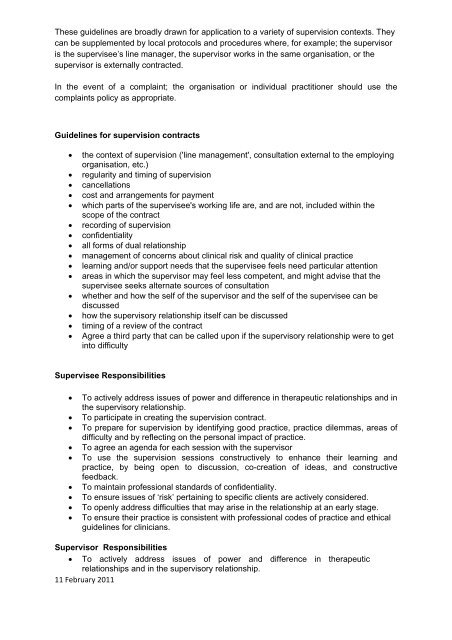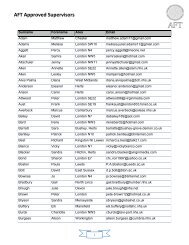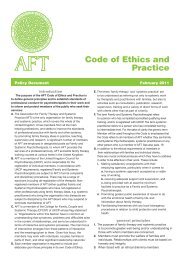Clinical supervision policy - AFT
Clinical supervision policy - AFT
Clinical supervision policy - AFT
Create successful ePaper yourself
Turn your PDF publications into a flip-book with our unique Google optimized e-Paper software.
These guidelines are broadly drawn for application to a variety of <strong>supervision</strong> contexts. They<br />
can be supplemented by local protocols and procedures where, for example; the supervisor<br />
is the supervisee’s line manager, the supervisor works in the same organisation, or the<br />
supervisor is externally contracted.<br />
In the event of a complaint; the organisation or individual practitioner should use the<br />
complaints <strong>policy</strong> as appropriate.<br />
Guidelines for <strong>supervision</strong> contracts<br />
• the context of <strong>supervision</strong> ('line management', consultation external to the employing<br />
organisation, etc.)<br />
• regularity and timing of <strong>supervision</strong><br />
• cancellations<br />
• cost and arrangements for payment<br />
• which parts of the supervisee's working life are, and are not, included within the<br />
scope of the contract<br />
• recording of <strong>supervision</strong><br />
• confidentiality<br />
• all forms of dual relationship<br />
• management of concerns about clinical risk and quality of clinical practice<br />
• learning and/or support needs that the supervisee feels need particular attention<br />
• areas in which the supervisor may feel less competent, and might advise that the<br />
supervisee seeks alternate sources of consultation<br />
• whether and how the self of the supervisor and the self of the supervisee can be<br />
discussed<br />
• how the supervisory relationship itself can be discussed<br />
• timing of a review of the contract<br />
• Agree a third party that can be called upon if the supervisory relationship were to get<br />
into difficulty<br />
Supervisee Responsibilities<br />
• To actively address issues of power and difference in therapeutic relationships and in<br />
the supervisory relationship.<br />
• To participate in creating the <strong>supervision</strong> contract.<br />
• To prepare for <strong>supervision</strong> by identifying good practice, practice dilemmas, areas of<br />
difficulty and by reflecting on the personal impact of practice.<br />
• To agree an agenda for each session with the supervisor<br />
• To use the <strong>supervision</strong> sessions constructively to enhance their learning and<br />
practice, by being open to discussion, co-creation of ideas, and constructive<br />
feedback.<br />
• To maintain professional standards of confidentiality.<br />
• To ensure issues of ‘risk’ pertaining to specific clients are actively considered.<br />
• To openly address difficulties that may arise in the relationship at an early stage.<br />
• To ensure their practice is consistent with professional codes of practice and ethical<br />
guidelines for clinicians.<br />
Supervisor Responsibilities<br />
• To actively address issues of power and difference in therapeutic<br />
relationships and in the supervisory relationship.<br />
11 February 2011
















